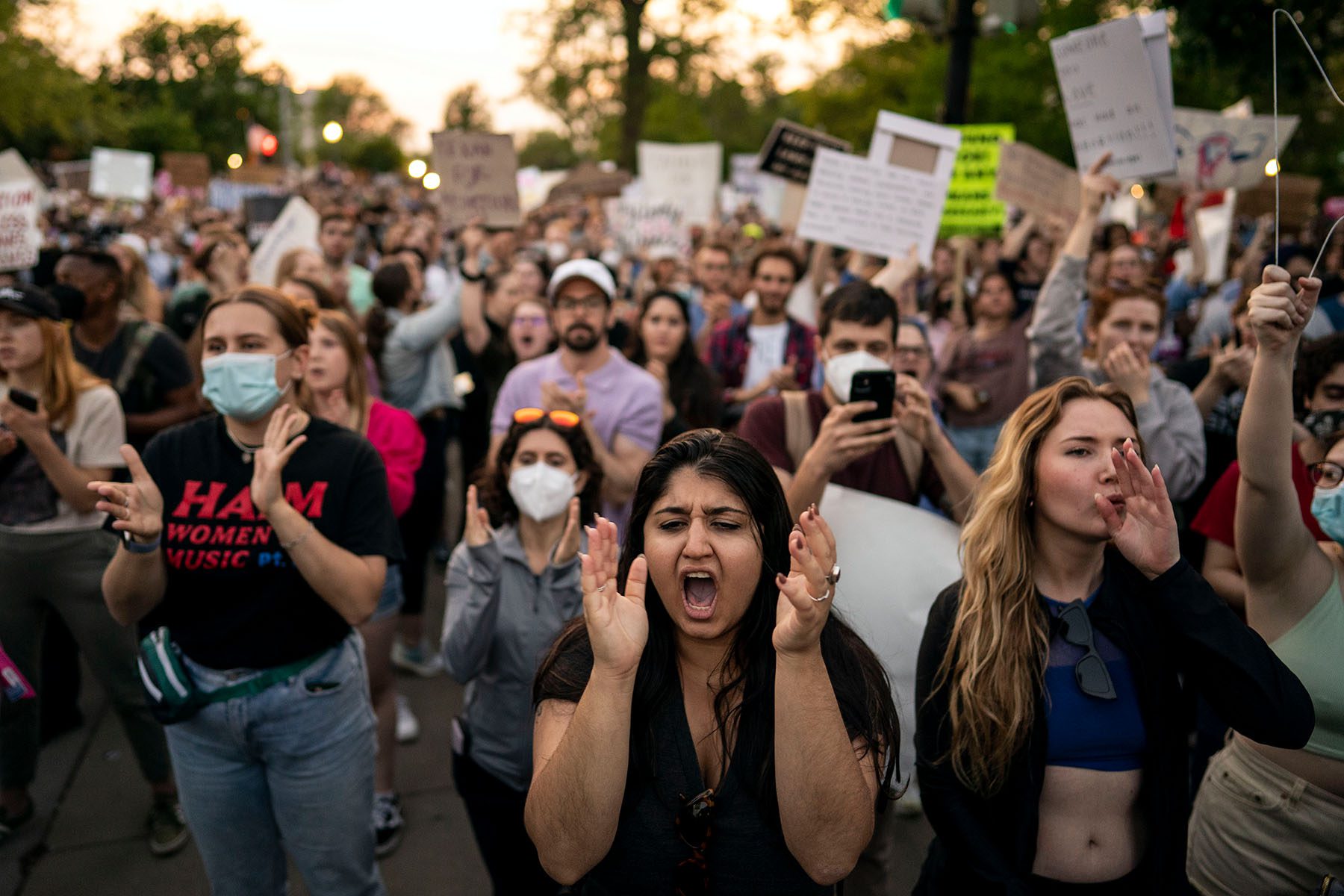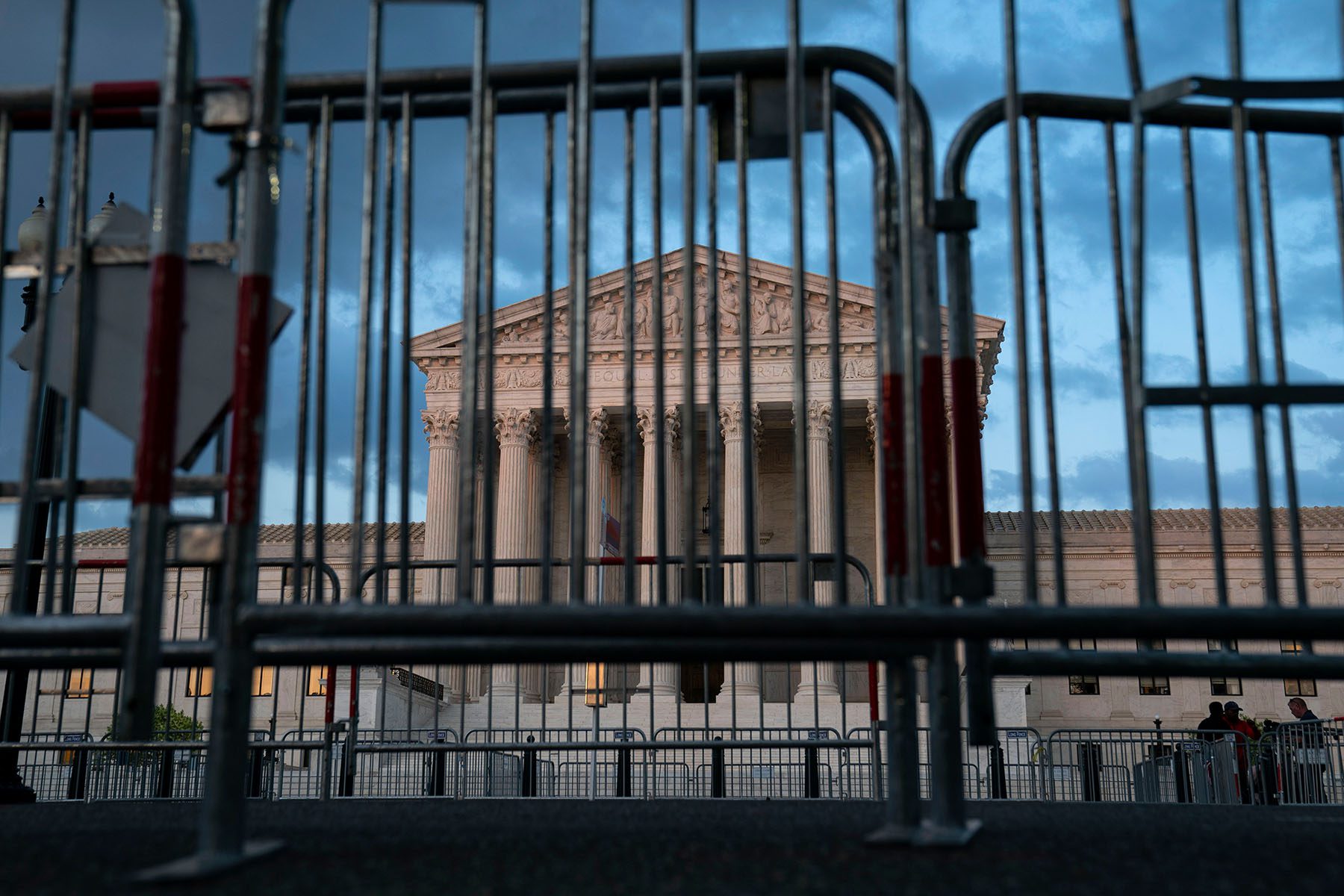In the days since a Supreme Court draft opinion that would overturn Roe v. Wade leaked, corporate America has offered a familiar response: silence.
It mirrors the days following Texas’ implementation of its six-week abortion ban last September — silence from the many companies in the state. But in the weeks after Texas’ ban went into effect, some companies started to speak publicly and implement policies to assist employees who wanted to get an abortion out of state. That response to the Texas law, then the most restrictive abortion ban in the country, created a precedent that corporations could draw on now that it seems imminent that Roe will be overturned. So far, they have not.
The draft opinion, written by Justice Samuel Alito and confirmed to be authentic, is not yet finalized, but it does make it clear it is very likely the Supreme Court will overturn Roe v. Wade this summer when it issues its final ruling on a Mississippi case before the court, leaving the decision on abortion up to individual states. About half of states will likely enact some form of abortion restriction as a result.
That makes the issue unavoidable for large companies.
Some have practical considerations to account for: Unlike with the Texas ban, the loss of Roe will mean corporations that provide health coverage and other benefits across state lines will have to weigh how to logistically do that when it comes to abortion.
But more broadly, since the rise of the #MeToo movement and the pandemic that decimated many jobs held by women, many corporations have spoken out about their commitments to inclusion for women, who up until 2020 made up more than half of the American workforce. One in four will have an abortion before the age of 45, a number that doesn’t include transgender and nonbinary people impacted, who major companies have also increasingly expressed a desire to support.
And yet only a handful of companies have publicly addressed the seemingly imminent fall of Roe. The 19th reached out to 30 of the largest employers in the country, including some of the Fortune 500 companies led by women — this year at a historic high — including CVS, Walgreens and General Motors, and companies that are major contributors to anti-abortion political action committees, such as Walmart, Coca-Cola and Google.
Only two in that group — Amazon and Citigroup — have said they will cover costs for employees who live in a state banning abortion to get the procedure in another state, though Amazon’s announcement, which came just hours before the draft ruling was leaked, is limited to employees on employer-sponsored health insurance and excludes many of the lowest paid employees, such as drivers.
T-Mobile, which has donated more than $340,000 since 2016 to groups heavily involved in electing anti-abortion senators, state legislators and governors, said in a statement Friday that its “political donations have always been bipartisan and solely focused on supporting issues and topics relevant to our business and industry.”
The rest of the companies declined to comment or did not respond at all.
“Corporations have to choose a side of history right now — the longer they are silent, the weaker their claim is that they really care about women in the workplace,” said Noreen Farrell, a civil rights attorney and the executive director of Equal Rights Advocates, a nonprofit gender advocacy organization. “This may not be the intention of silence, but this is the message.”
The decisions companies do make have power, and they can be particularly meaningful in a post-Roe world where corporations can influence state politics on abortion if they wish to. In 2016, when North Carolina passed a bill to bar transgender people from using bathrooms that match their gender identity, PayPal and Deutsche Bank rolled back plans to expand in the state, helping to incite a repeal of the law in 2017.
The news on abortion also wasn’t necessarily unexpected. The Supreme Court heard arguments in the case that could potentially overturn Roe in December, and a decision was expected in June or July, with many expecting the court’s conservative majority would side with overturning Roe. Still, companies seem to have been caught flat-footed.
On Friday, Popular Information, a newsletter that covers corporate political donations, reported that a large public relations firm, Zeno, representing clients that include Coca-Cola, Netflix, Starbucks and Hershey’s, is circulating a template email advising clients to stay quiet on the measure.
“Do not take a stance you cannot reverse, especially when the decision is not final,” it reads, adding that the topic can be a “no-win” situation for companies because it could alienate some customers and stakeholders. Companies should steer clear of talking to or even pitching breaking news outlets at all, Zeno advises, to avoid being asked about a stance on the draft opinion.
Some of the reluctance seems to be unique to abortion, one of the most politically charged issues of our time partially because it’s so complex — polling shows that Americans have complicated, nuanced positions on abortion that go beyond a simple binary. Companies fear of alienating consumers or mistepping. But in the past two years, corporations have been quick to speak out on other charged topics, including threats to voting access, LGBTQ+ rights and racial justice.

The landscape in terms of worker power and corporate expectations has also shifted in the past several years and certainly the past few months. Emboldened by a job market that has given them more options, workers are demanding companies show up meaningfully in pay, benefits and forms of corporate giving that mirror their values, particularly on issues related to gender and racial equity. It’s too soon to see how or if that will play out with abortion, Stark said, because workers may be reluctant to share on an issue that for many is highly sensitive.
Just over half of voters want companies to speak out on abortion access, according to a Morning Consult/Politico poll released Wednesday. Most want to see companies provide resources to help employees and customers affected by a potential ruling overturning Roe, and 45 percent want to see companies put out a statement in support of it.
But experts said companies may also be treading carefully given recent blowback, most notably that faced by the Walt Disney Company. A significant political donor to the Florida politicians who helped pass the “Don’t Say Gay” ban, Disney faced furious backlash from the public and employees who went on strike earlier this year when the company said the best way it could support them was through the content it created. It backpedaled too late, pulling political donations in the state and leading the Florida legislature to pass a bill to dissolve Disney’s special taxing district in retaliation. And in Washington, Sen. Marco Rubio, a Florida Republican, introduced a bill this week that would block companies from getting tax breaks if they help their employees get out-of-state abortions.
Ensuring they don’t have a similar misstep is paramount in this moment, said Jen Stark, who has led the “Don’t Ban Equality” campaign since 2019 encouraging business leaders denounce abortion bans.
“They know it’s beyond the performative now,” said Stark, who is also a senior director for corporate strategy at the Tara Health Foundation. “They need to say: ‘What are they doing to mitigate the harm to their workforce? How do they acknowledge the role, particularly for those engaged in political giving, that has supported extremist policy? And how do they help carve away the structural problems that got us here?”
But does that preclude them from saying anything at all in this moment?
“There are ways to find common language that still makes clear what you mean and what you value, so radio silence because the use of a particular word will blow up in their face — I think that’s either a cop out or a convenient excuse,” Farrell said.
Among the few companies that have spoken out this week was Levi Strauss & Co., which put out a statement less than 24 hours after the draft opinion leaked calling protecting reproductive health care, including abortion, “a critical business issue” that could undo some of the workplace gains women have made since Roe v. Wade was decided in 1973. It also committed to covering all medical and travel expenses for employees seeking abortions in neighboring states. On Friday, Tesla also announced plans to cover costs for workers seeking abortions out-of-state.
It’s still possible more such responses are coming, Stark said.
Behind the scenes, Stark said, companies are working with human resources and benefits managers to adjust their internal workforce practices, which in some cases go beyond covering abortion-related expenses, but also enhance paid sick leave policies and look at company subsidized child care support.
“We’re really trying to work with companies to think through not hiding additional increased benefits that they might be offering and addressing the needs of workers holistically,” Stark said. “It’s all about the internal communication at this moment. And so I do think companies are being mindful as they come out with these sort of enhancements in their benefits and talking about what they’re doing.”
In the weeks after Texas’ ban on abortion after six weeks gestation went into effect in September, support from companies started to trickle in. Dating app Bumble created a relief fund to support people seeking abortions outside Texas and software company Salesforce offered to help its employees relocate out of Texas if they were impacted by the new law.
Experts are also eyeing how the federal government could work with corporations to encourage abortion-related protections. The White House did not respond to a request for comment on whether it’s considering any incentives for businesses that provide benefits for employees seeking an abortion or any other such incentives.
“When government can’t or won’t act,” Stark said, “we look to businesses again and again and this is one of those moments.”







